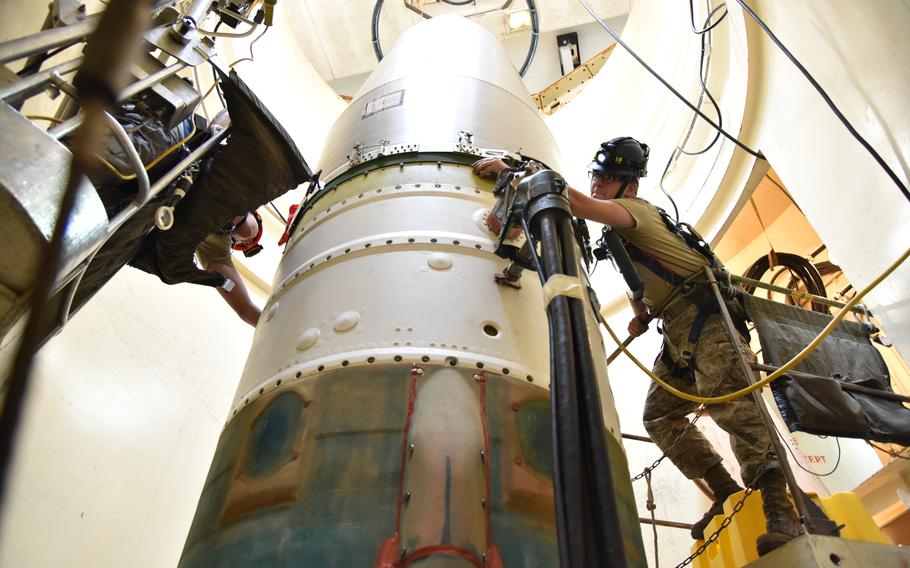
Airman 1st Class Jackson Ligon, left, and Senior Airman Jonathan Marinaccio, 341st Missile Maintenance Squadron technicians, connect a reentry system on an intercontinental ballistic missile during a Simulated Electronic Launch-Minuteman test Sept. 22, 2020, at a launch facility near Great Falls, Mont. (Daniel Brosam/U.S. Air Force)
Since March, President Donald Trump has taken the lead in U.S. nuclear negotiations between Russia and the U.S. But as the U.S. wavered in its support for Ukraine — first cutting, then reinstating military and intelligence aid — negotiations for nuclear talks collapsed along with hopes for peace.
Trump’s “America First” strategy has led to the downsizing of the State Department’s Arms Control Bureau. It left the U.S. without the diplomatic bench to negotiate a replacement for New START, the last major arms control treaty capping U.S. and Russian arsenals. It expires on Feb. 4, 2026.
His personal diplomacy with Russia’s Vladimir Putin now seems the only viable path toward a commitment on nuclear weapon reductions. Israel’s recent attacks on Iran’s nuclear facilities only worsen his negotiating position.
Trump must tread carefully. By failing to keep Ukraine policy separate from nuclear talks, Trump signals that the U.S. may sacrifice security guarantees to secure a New START treaty. This emboldens Russia to issue nuclear threats and act on them, as Putin seeks to weaken NATO and restore Russia to its former glory.
Trump’s first exchange with Putin suggests his team is prioritizing long-term nuclear arms reductions, initially seeking an informal freeze on new nuclear warhead production. This could set the stage for a broader deal maintaining deployed weapons limits at New START levels.
Under other circumstances, this might be mutually beneficial. But Russia’s rejection of Trump’s initial Ukraine peace offer suggests Putin will only proceed if the U.S. is willing to accept territorial acquisition by force. If Trump concedes this point, European security would be deeply compromised, a fear that several European leaders have expressed.
Meanwhile, Trump’s secretary of defense, Pete Hegseth, lacks experience in deterrence politics. Unlike former Defense Secretary Lloyd Austin, who firmly promised devastating conventional retaliation if Russia used nuclear weapons in Ukraine, it is unclear whether Hegseth would issue similar warnings.
This increases the risk that Russia might use tactical nuclear weapons in future European conflicts without fear of significant U.S. response, especially as NATO allies grow more uncertain of U.S. commitments.
When former President Joe Biden offered nuclear talks without preconditions, Russia stalled, accusing the U.S. of trying to engineer a strategic defeat in Ukraine. Just weeks before Trump’s election, Putin stated he was open to nuclear negotiations, betting that a new U.S. administration would prioritize deals over democratic norms. His gamble seems to have paid off.
It is important to remember that Biden deliberately separated nuclear arms control from Ukraine negotiations. His approach prioritized European security and nuclear stability, He worked toward long-term arms reductions while avoiding short-term escalation risks.
Ultimately, Biden was skeptical that Putin would follow through on nuclear commitments, so he focused on backing Ukraine and preserving U.S. credibility for future negotiations.
Today, with New START set to expire in February and U.S. policymakers facing pressure to avoid exceeding treaty limits by uploading new warheads, a new nuclear deal is critical. However, as Biden’s caution showed, policymakers should not rush to meet Putin’s eagerness for a deal without thoroughly questioning his motives.
Going forward, policymakers should weigh the risks of pursuing long-term nuclear reductions while the Ukraine war remains unresolved. History suggests Putin may wait until the last moment to negotiate, as a nuclear arms race is not in Russia’s interest.
But early recent signs indicate that Trump may be willing to trade America’s role as Europe’s security guarantor for a fragile peace deal and favorable “peace president” headlines.
In this scenario, Putin would gladly offer small nuclear concessions in exchange for security assurances, effectively legitimizing territorial conquest as a bargaining piece. This is a risk we cannot afford.
Shawn Adams is a program assistant fellow for Nuclear Disarmament and Defense Spending at the Friends Committee on National Legislation.